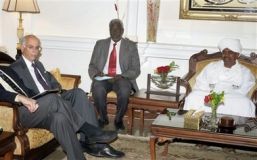US warns of possible ‘coercive’ action against Sudan
Dec 20, 2006 (WASHINGTON) — Sudan must open a path toward ending the Darfur crisis before the end of the year or the international community will take “coercive” action against the Islamic government, a top U.S. diplomat said Wednesday.
 Andrew Natsios, special White House envoy to Sudan, said international patience is running out on Sudan almost four years deep into Darfur’s humanitarian disaster.
Andrew Natsios, special White House envoy to Sudan, said international patience is running out on Sudan almost four years deep into Darfur’s humanitarian disaster.
But he declined to say what options are being considered. “It’s not useful to make threats,” said Natsios, briefing reporters. U.K. officials have said that creation of a no-fly zone over Darfur is one of the options being considered.
Natsios said there have been so many threats against the Sudanese government to bring peace to Darfur that they no longer take them seriously. “None of the threats have been carried out. I think we should stop making threats,” said Natsios, who met with Sudanese President Omar al-Bashir in Khartoum last week.
Hundreds of thousands of people in Darfur have died and an estimated 2.5 million have been driven from their homes since early 2003.
A 7,000-member African Union force has been unable to bring stability to Darfur, prompting proposals for the creation of a U.N.-A.U. “hybrid” mission totaling some 20,000 troops. But Sudan has been unwilling to go along.
To avoid a crisis with the international community, Natsios said, al-Bashir must allow 60 U.N. troops and civilians stationed in Khartoum to be transported with their equipment to Darfur by the end of the year.
Another requirement, he said, is al-Bashir’s approval of the combined U.N.-A.U. peacekeeping proposal, which would be carried out over three phases. The proposal is spelled out in a letter U.N. Secretary-General Kofi Annan has sent to al-Bashir. A top aide to Annan will remain in Khartoum until al-Bashir responds, Natsios said.
Earlier Wednesday, Secretary of State Condoleezza Rice met with Natsios and said afterward she expects the Sudanese government to respond positively to the proposal for a hybrid force.
It is “extremely important that a robust security force, a robust peacekeeping force” be created “to help end the violence and bring relief to the many innocent men, women and children who are suffering in Sudan,” Rice said.
A no-fly zone would be designed prevent Sudanese military aircraft from continuing to assist the government-backed Arab militias believed to be responsible for most of the atrocities in Darfur. Another option is imposing an asset freeze and a travel ban on Sudanese officials who have abetted the abuses in Darfur.
China has blocked decisive U.N. Security Council action against Sudan over the years because the country has become a key oil supplier for the Chinese. Lately, however, Natsios said, China has shown a much greater willingness to cooperate.
Natsios added that Arab countries also support action against Sudan after playing a passive role in the early phases of the crisis.
The envoy rejected suggestions that the Bush administration has held back on Sudan because of the African country’s role as a partner in tracking down international terrorists.
He said he never would have accepted the envoy role if the administration were playing a double game in Sudan.
(AP)
